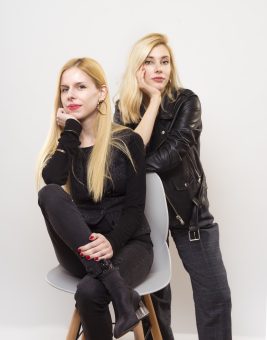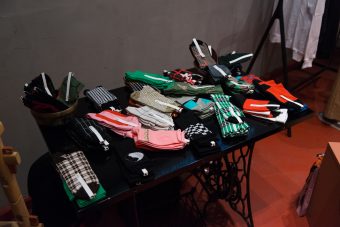
The concept of fast fashion prevails in the fashion industry. Garments are mass produced, and from harmful materials, and in the process of their creation, many natural resources are consumed. When we consider the rights of workers in this industry are often abused, it is clear that there is no place for the concept of sustainability in this kind of fashion. On the other hand, we as users are not sinless either. We still don’t recognize unsustainability in the way we wear clothes. We buy a lot and recklessly, as marketing and trends dictate to us, and we wear that clothes for a short time, which leads to the accumulation of textile waste in landfills.
We talked to Dunja Jovanović and Marija Radaković, the authors of the F.fm podcast show, about what sustainable fashion is and how to adopt a healthy attitude towards clothes. In their show, they and their interlocutors from the domestic fashion industry seek a balance between fashion and environmental protection. The F.fm podcast is a radio format that is broadcast every other Wednesday of the month on RadioAparat.com.
Three years ago, Dunja and Marija launched Sustainable Fashion Day, an event held twice a year as part of the official program of Belgrade Fashion Week. In the meantime, they worked on a podcast, wrote columns, held forums and fairs of sustainable local brands, and finally founded the Association for Sustainable Initiatives with the idea of influencing environmental and social change through education and action.
How to tell if a fashion brand is sustainable?
Sustainable fashion is a holistic approach to the design, production, sale, consumption and use of clothing, accessories, and footwear to restoring ecosystems and respecting and protecting human rights, thus enabling the equal development of communities. But what does it mean when we say that a material is sustainable?
In their posts on Instagram, Dunja and Marija mention textiles made from cork, “leather” made from cactus and biosporin. Today, there is more and more talk about mushrooms and their use in the textile industry.
In focus:
Our readers had the opportunity to read in the previous issue the story of the new material Biosporin, which is an ecological alternative to styrofoam, and was obtained from one type of fungus. This material is produced (or perhaps a better word – grown) by the domestic startup SOMA, and their idea is to replace different types of packaging with it. They are already working with wineries and ceramic producers who want their products to be completely sustainable. California-based company MycoWorks has developed an alternative to animal and plastic skin from a single type of fungus. This material, in addition to being completely safe to wear, is not sprayed with various chemicals, as is the case with other skin types. When it decomposes in a landfill, it actually turns into fertilizer. Maja Halilović and Adrien Ujhazi made sure that our region does not lag behind the world. They work on the development of skin from a symbiotic culture of bacteria and yeast, which is also very sustainable. Research is ongoing, and it should answer how this material behaves when worn and how it is maintained.

The authors of the F.fm podcast believe that in addition to the problems caused by today’s fashion industry, it is important to continuously communicate alternatives to today’s fast fashion system to inform citizens about possible solutions and better choices available to us – such as domestic, small local brands. They are one of the options of sustainable fashion because they produce a small series of clothes. They consider every aspect of the business – from materials through working conditions to product packaging. It is very encouraging that more and more brands on the local scene are thinking about making their business (more) sustainable.
“On our Instagram profile, we have several separate cat- egories dedicated to domestic producers, as well as a series of posts #domacicakida, so we suggest readers explore the local scene and other brands behind really great, creative and responsible people”, Dunja reveals how to keep up. Recommended manufacturers include:
@marijahandmade , in addition to recycling fabrics and materials, also employs women from vulnerable categories;
@thema.page – children’s clothing brand that uses certified organic cotton;
@manonija introduced an ordering system according to which sewing is started only after a certain number of orders;
@ivkowomen company introduces numerous innovations such as electricity from renewable energy sources, water purification, fabric recycling and production certification.
Marija also points out the work of fashion designer Ana Trošić Trajković, who opened the concept store Biro 354c three years ago, where clothes can be rented and redesigned to extend its shelf life. There is also a team of young people who are developing an application for exchanging clothes, and their profile on Instagram is Barter.rs.
Prepared by: Jovana Canić
Read the whole interview in the new issue of the Energy portal Magazine CIRCULAR ECONOMY, march 2021 – may 2021.



